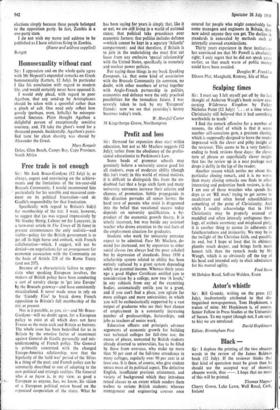Profit and loss
Sir: Demand for expansion does start within education, but not as Mr Maclure suggests (12 July); rather from the obedience of the profes- sional educationist to Parkinson's Law.
Some heads of grammar schools may genuinely believe a university course good for all students, even of moderate ability (though this isn't true); in this world of mixed motives, it is difficult to distinguish this from the un- doubted fact that a large sixth form and many university entrances increase their salaries and chances of promotion. Subtle propaganda in this direction pervades all senior forms; the hard core of parents who resist is dragooned into the belief that vocational success today depends on university qualification, a by- product of the economic growth theory. It is utterly incorrect, but woe betide any assistant teacher who draws attention to the real facts of the employment situation for graduates.
Students who work for university entrance expect to be admitted. Pace Mr Maclure, de- mand has increased, not by expansion to other sricial classes (we always had the poor scholar) but by depression of standards. Since 1930 a scholarship system related to ability has been entirely replaced by a grant system depending solely on parental income. Whereas thirty years ago a good Higher Certificate entitled you to consideration by a college, now two 'A levels,' in any subjects from any of the examining bodies, automatically entitle you to a grant, and if you can't find a place, you agitate for more colleges and more universities; in which you will be enthusiastically supported by a vast output of graduates who see their best chance of employment in a constantly increasing number of professorships, lectureships, and jobs as teachers of senior work.
Education officers and principals advance arguments of economic growth for building vast technical colleges for full-time use; the excess of places, unwanted by British students already diverted to universities, has to be filled by those from overseas, who make up More than 50 per cent of the full-time attendance in many colleges, regularly over 90 per cent in at least one. It is these, of course, who give student unrest most of its political aspect. The defective English, insufficient previous attainment, and variety of background which they introduce retard classes to an extent which renders them useless to serious British students; whereas management and engineering courses once
catered for people who might conceivably be- come managers and engineers in Britain, they now admit anyone they can get. The decline in standards is concealed by methods such as internally assessed examinations.
Thirty years experience in these institutions has convinced me that Mr Powell is absolutely right; I only regret that he did not speak years earlier, so that much waste of public money could have been avoided.
Douglas W. Franklin Dhoon Plat, Maughold, Ramsey, Isle of Man






































 Previous page
Previous page